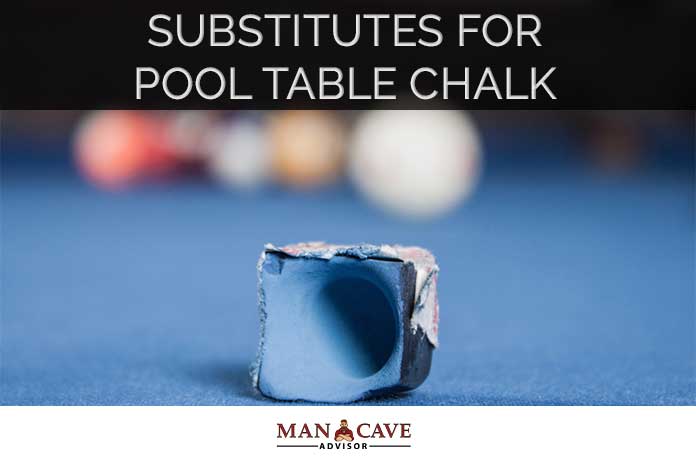Lack of pool chalk should never be a reason to stop a great game with friends. Pool chalk is used to increase the friction between the cue tip and the ball, which helps prevent miscues and ensure accurate shots. If you don’t have access to pool chalk, here are a few substitutes you can try:
1. Talcum Powder
Baby powder or talcum powder can be used as a substitute for pool chalk because it can help reduce friction between the cue tip and the ball. To use it as a substitute, simply sprinkle a small amount of the powder on the cue tip and rub it in with your fingers. Make sure to rub it in evenly to ensure consistent contact with the ball.
2. Chalkboard Chalk
Chalkboard chalk can be used as a temporary substitute for pool chalk. Although not ideal, it can help increase the friction between the cue tip and the ball. Simply rub the chalk on the cue tip until it’s evenly coated. However, keep in mind that chalkboard chalk may not provide the same level of consistency and grip as pool chalk, and it may wear off quickly.
3. Baking Soda
Baking soda can be mixed with water to create a paste that can be applied to the cue tip as a substitute for pool chalk. The paste can help increase the friction between the cue tip and the ball, but it may not last as long as pool chalk. Mix a small amount of baking soda with water until it forms a paste, and then apply it to the cue tip. Make sure to rub it in evenly and let it dry before using it to ensure consistent contact with the ball.
4. Wax Paper
Wax paper can be used as a temporary substitute for pool chalk. Rubbing a small piece of wax paper over the cue tip can help create a temporary friction that can help prevent miscues. Simply rub the wax paper on the cue tip until it’s evenly coated. However, keep in mind that this substitute may not last as long as pool chalk and may need to be reapplied frequently.
5. Scuffing the Pool Tip
Scuffing the pool tip is a technique that can be used as a temporary substitute for pool chalk. When a pool cue tip is scuffed, it means that the surface of the tip is roughened or made more porous to increase the grip and friction between the cue tip and the ball. This can help prevent miscues and ensure accurate shots.
To scuff the pool tip, you can use a scuffing tool or a piece of sandpaper to roughen the surface of the tip. Gently scrape the surface of the tip with the scuffing tool or sandpaper, being careful not to damage the tip or remove too much material.
However, it’s important to note that scuffing the pool tip is not a substitute for pool chalk in the long term. Over time, scuffing can wear down the tip and affect its performance. Additionally, scuffing may not provide the same level of consistency and grip as pool chalk, especially if the tip becomes too rough or damaged. Therefore, it’s best to use scuffing as a temporary solution when pool chalk is not available, and to use pool chalk as the primary method of increasing the grip and friction between the cue tip and the ball.
Does Pool Chalk Help Your Game?
If you need some reasons why using pool table chalk matters to your game then watch this video.
Why Use Pool Chalk Instead of a Substitute?
There are several reasons why pool chalk is the preferred method of increasing the friction between the cue tip and the ball, and why substitutes are not ideal for long-term use. Here are some reasons why:
- Consistency: Pool chalk provides a consistent level of grip and friction between the cue tip and the ball, which is essential for accurate shots. Substitutes such as baby powder, talcum powder, or wax paper may not provide the same level of consistency, which can affect the accuracy and consistency of shots.
- Durability: Pool chalk is designed to last longer than most substitutes, which can wear off quickly or need to be reapplied frequently. Using substitutes as a long-term solution can be costly and time-consuming.
- Compatibility: Pool chalk is designed specifically for use with pool cues and pool balls, which ensures compatibility and optimal performance. Substitutes may not be compatible with pool equipment or may damage the cue tip or ball over time.
- Effectiveness: Pool chalk has been tested and proven to be effective in reducing miscues and increasing accuracy in pool. Substitutes may not be as effective or may have unintended consequences such as damaging the cue tip or reducing the lifespan of the equipment.
Final Thoughts
Substitutes such as baby powder, talcum powder, or wax paper can be used as a temporary solution when pool chalk is not available but pool chalk is the preferred method for increasing the grip and friction between the cue tip and the ball due to its consistency, durability, compatibility, and effectiveness. It’s important to protect your investment. Pool chalk is not expensive to buy and these substitutes might be a little harder to remove if you get them on your table.

